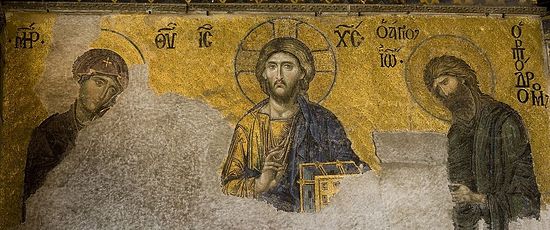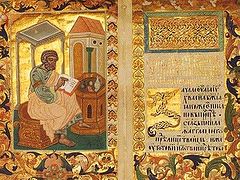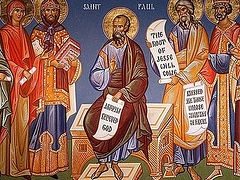Previous post in the series: Literalism: The Word of God vs. the Scriptures
First post in the series: Jesus Christ, The Word of God, and Scriptures
In this blog series we explored the relationship between Jesus the incarnate Word of God and the Scriptures as the written Word of God. Whereas Protestant Christians treat their Bibles as The Word of God, the history and Tradition of Orthodoxy Christianity shows the Church as celebrating Jesus Christ as the incarnate Word of God, to whom the written texts of the Scriptures bear witness. Indeed, Christ is found clothed or hidden in the texts of the Scriptures, even in the Old Testament. This is what makes the Scriptures so beautiful. They are essential for the revelation which occurs through those texts which clothe and hide the Christ. One could say they are the majesty with which Christ clothes himself (Psalm 93:1). Yet, we come to Christ the personal Word, and realize the Scriptures point beyond themselves to Him – as Jesus Himself taught in John 5:39.
The Word of God is divine, but is not a book. The Scriptures bear witness to whom the Word is -the Second Person of the Holy Trinity who became incarnate as human. Jesus is the living Word, by whom all things visible and invisible were created. The Word of God is not a thing but a person who acts in all creation and throughout history. It is He who entered into history in the incarnation of the Word.
For the Creator of the world is truly the Word of God: and this is our Lord, who in the last times was made man, existing in this world, and who in an invisible manner contains all things created, and is inherent in the entire creation, since the Word of God governs and arranges all things; and therefore He came to His own in a visible manner, and was made flesh, and hung upon the tree, that He might sum up all things in Himself. (St. Irenaeus of Lyons, Against Heresies and Fragments, Kindle 8134-37)
The Scriptures are indeed a type of incarnation of the Word – they make visible to us words about God. They make visible to us in printed form the words which God speaks. Yet, still they are bearing witness to Christ and not coterminous with Him. The Scriptures witness to Christ, and Christ reveals God the Father to us. The physical world is thus revealed as capable not only of bearing witness to God but of bearing God and being the very means by which we encounter God. The material world is not that which separates us from God or prevents us from encountering Him. The material world ever more miraculously is capable of union with God and of being the means for us to attain theosis. The written manuscripts of Scriptures can convey us all the way to the divine Persons of the Holy Trinity.
“So long as we only see the Logos of God as embodied multifariously in symbols in the letter of Holy Scripture, we have not yet achieved spiritual insight into the incorporeal, simple, single and unique Father as He exists in the incorporeal, simple, single and unique Son, according to the saying, ‘He who has seen Me has seen the Father . . . and I am in the Father and the Father in Me’ (John 14:9-10). We need much knowledge so that, having first penetrated the veils of the sayings which cover the Logos, we may with a naked intellect see – in so far as men can – the pure Logos, as He exists in Himself, clearly showing us the Father in Himself. Hence a person who seeks God with true devotion should not be dominated by the literal text, lest he unwittingly receives not God but things appertaining to God; that is, lest he feel a dangerous affection for the words of Scripture instead of for the Logos. For the Logos eludes the intellect which supposes that it has grasped the incorporeal Logos by means of His outer garments, like the Egyptian woman who seized hold of Joseph’s garments instead of Joseph himself (cf. Gen. 39:7-13), or like the ancients who were content merely with the beauty of visible things and mistakenly worshiped the creation instead of the Creator (cf. Rom. 1:25).” (St. Maximos, The Philokalia, Kindle Loc. 15419-32)
The written Word of God is a gift to us, however, the Giver of the gift makes Himself fully accessible to us. The gifts don’t stand between us and God but are the very means by which we enter into communion with God. We are in the spiritual life moving from the visible to the incomprehensible, from the texts of the bible to the ineffable God. However beautiful the words and expressions and texts of the Bible are, their Creator is even more so. Those written texts lead us to beyond themselves to the Truth. They are but signs of the reality of God.
St Paul most accurately and lucidly revealed to every believing soul the perfect mystery of the Christian faith, showing to all how to attain experience of it through divine grace. This mystery is the effulgence of celestial light in the vision and power of the Spirit. He did not want anyone to think that the illumination of the Spirit consists simply in enlightening us through conceptual knowledge, and so to risk falling short of the perfect mystery of grace through ignorance and laziness. To indicate the true character of spiritual knowledge St Paul therefore gives as an example the glory of the Holy Spirit that shone from the face of Moses. ‘If the ministry of death,‘ he says, ‘engraved in letters on stone, was accompanied by such glory that the sons of Israel could not bear to gaze at the face of Moses because of the glory, transitory though it was, that shone from it, then how much greater must the glory be that accompanies the ministry of the Spirit? If the ministry of condemnation is glorious, the ministry of righteousness must greatly excel it in glory. Indeed, what once seemed full of glory now seems to have no glory at all, because it is outshone by a glory that is so much greater. If what was transitory came with glory, what endures will be far more glorious’ (2 Cor. 3:7-11). He says ‘transitory’ because it was Moses’ mortal body that shone with the glory of light. And he continues: ‘Having such hope as this, we can proceed with great confidence’ (2 Cor. 3:12). A little later he affirms that this everlasting and immortal glory of the Spirit shines even now with immortal and indestructible power in the immortal inner being of the saints: ‘With unveiled face we all’ – all, that is to say, who through perfect faith are born in the Spirit – ‘reflect as in a mirror the glory of the Lord, and are transfigured into the same image from glory to glory through the Lord who is the Spirit’ (2 Cor. 3:18). The words ‘with unveiled face’ indicate the soul; he adds that when one turns back to the Lord the veil is taken off, and that the Lord is the Spirit (cf. 2 Cor. 3:16-17). By this he dearly shows that from the time of Adam‘s transgression a veil of darkness has encroached upon mankind and has covered the soul. But we believe that through the illumination of the Spirit this veil is now removed from truly faithful and saintly souls. It was for this reason that Christ came; and to those who truly believe in Him God has given the grace to attain this measure of holiness. As we said, the effulgence of the Holy Spirit is not merely some kind of revelation on the level of conceptual images, or merely an illumination of grace. It is the true and unceasing effulgence of God’s own light in the soul: ‘The God who said, “Out of darkness let light shine”, has made His light shine in our hearts, to give us the illumination of the knowledge of Christ’s glory’ (2 Cor. 4:6). (St Symeon Metaphrastis, THE PHILOKALIA, Kindle Loc. 34467-506)
We come to Christ, not just to the words about Him. In Him we find life. The scriptures point to Him and thus show us the way beyond this world to life in the world to come.
“According to St John’s Gospel, all things were made through the Logos, or Word of God (John 1.3). The term logos is in Greek a key term, difficult to translate into other languages, because it has such a wide range of connotations: it can mean word, reason, meaning, principle, definition. So the Logos of God, through whom the universe has been created, is both the word, utterance, of God the Father, and also the meaning of the universe, and the meaning of everything in the universe. To say that the cosmos was created by the Logos of the Father is not just to say that it was created by God, but also to suggest that the meaning of the cosmos is to be found in the Logos.” (Andrew Louth , Introducing Eastern Orthodox Theology, Kindle Loc. 886-91)
The Word of God does not merely inform us about God. The Word encounters us and engages us and gives us full experience of God the Trinity. The Word of God forms us in God’s image. The Word of God reforms us when we are fallen in sin and conforms us to God’s will. The Word of God does all of this because of Who the Word is.
In the beginning was the Word, and the Word was with God, and the Word was God. He was in the beginning with God; all things were made through him, and without him was not anything made that was made. In him was life, and the life was the light of men. . . . And the Word became flesh and dwelt among us, full of grace and truth; we have beheld his glory, glory as of the only Son from the Father. (John 1:1-4, 14)




